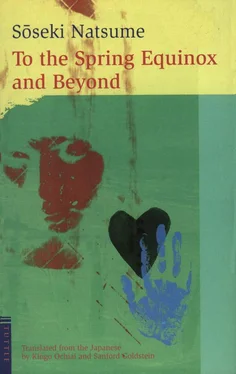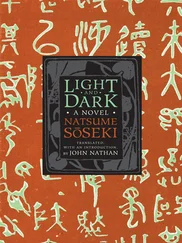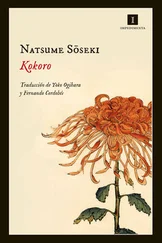Natsume Soseki - To the Spring Equinox and Beyond
Здесь есть возможность читать онлайн «Natsume Soseki - To the Spring Equinox and Beyond» весь текст электронной книги совершенно бесплатно (целиком полную версию без сокращений). В некоторых случаях можно слушать аудио, скачать через торрент в формате fb2 и присутствует краткое содержание. Год выпуска: 2006, Издательство: Tuttle Publishing, Жанр: Классическая проза, на английском языке. Описание произведения, (предисловие) а так же отзывы посетителей доступны на портале библиотеки ЛибКат.
- Название:To the Spring Equinox and Beyond
- Автор:
- Издательство:Tuttle Publishing
- Жанр:
- Год:2006
- ISBN:нет данных
- Рейтинг книги:5 / 5. Голосов: 1
-
Избранное:Добавить в избранное
- Отзывы:
-
Ваша оценка:
- 100
- 1
- 2
- 3
- 4
- 5
To the Spring Equinox and Beyond: краткое содержание, описание и аннотация
Предлагаем к чтению аннотацию, описание, краткое содержание или предисловие (зависит от того, что написал сам автор книги «To the Spring Equinox and Beyond»). Если вы не нашли необходимую информацию о книге — напишите в комментариях, мы постараемся отыскать её.
To the Spring Equinox and Beyond — читать онлайн бесплатно полную книгу (весь текст) целиком
Ниже представлен текст книги, разбитый по страницам. Система сохранения места последней прочитанной страницы, позволяет с удобством читать онлайн бесплатно книгу «To the Spring Equinox and Beyond», без необходимости каждый раз заново искать на чём Вы остановились. Поставьте закладку, и сможете в любой момент перейти на страницу, на которой закончили чтение.
Интервал:
Закладка:
"You go to bed too," her mother said.
"But no one has come yet from Uchisaiwaicho or Kanda."
"They'll be here soon. It's all right. You can go to bed before they get here."
Sakiko went out to the corridor, but she looked back and beckoned Chiyoko. When Chiyoko came out, the girl whispered to be taken to the toilet. She was afraid because the room had no light. With a match Chiyoko kindled a hand lamp and turned the corner of the corridor with Sakiko. On the way back Chiyoko happened to glance into the servants' room, where in undertones the kitchen maid was talking over the brazier with a rick-shawman patronized by the family. She's probably giving him a detailed account, thought Chiyoko. The other maid was wiping trays in the living room, readying teacups in preparation for visitors.
Before long a few of the relatives who had been informed of the news came to pay their condolences. Some of the visitors left soon, promising their attendance at the funeral. To each visitor Chiyoko repeated her account of Yoiko's last moments, which had come on so suddenly. After midnight Osen brought in a portable warmer for those keeping the wake, but none would use it. The Matsumotos were exhorted to retire and, against their will, did so. Afterward Chiyoko kept the incense fresh and burning continuously by adding new sticks to those that had burned down. The rain had not yet stopped, but she no longer heard the sound of the downpour striking the plantain leaves. Rather, the sound on the zinc-roofed eaves sent into her ears the ceaseless drops of a desolate and lonely sadness. From time to time until the dawn broke, she took the cloth from Yoiko's face and sobbed.
The next day all the women present helped sew a hemp kimono in which to clothe Yoiko. The little sleeves and kimono skirt went round from hand to hand among the women, including Momoyoko, who had arrived from Uchisaiwaicho, and two wives from neighborhood families on friendly terms with the Matsumotos. Chiyoko carried in sheets of paper, a brush, and an inkstone to those gathered there, asking each to write on a single sheet the six Chinese characters Na-mu A-mi-da Butsu. When she came to Sunaga, she said, "Please, Ichi-san, copy some too."
"What are you going to do with them?" he asked with a puzzled look on his face as he took the brush and paper.
"Write as many of the characters as you can, as small as you can, all over the paper. Later we'll cut it into small strips, each with the six characters on it, and they'll be scattered into the coffin."
Everyone sat formally writing the prayer for Buddha's mercy. "Don't look at me while I'm writing," said Sakiko, screening her paper with her kimono sleeve as she composed her crooked strokes. The ten-year-old son said that he would write his prayer in kana. He copied several lines, all in syllabary letters as in a telegram.
In the afternoon just before Yoiko's body was to be placed into the coffin, Matsumoto told Chiyoko to dress it in the newly sewn kimono. Chiyoko, so choked with tears that she was unable to reply, took off Yoiko's clothes and raised the cold naked body in her arms. All over the child's back were purple spots. When it had been changed into its hemp kimono, Osen passed a small string of beads around its folded hands. A small braided hat and an equally small pair of straw sandals were placed into the coffin, as were the pair of red woolen socks that Yoiko had worn until the evening before. At once there drifted before Chiyoko's eyes the image of the dangling tassels attached to the strings of those socks. All the toys that had been given to the child were crowded into the space at the child's head and feet. And last of all, over the body were strewn like piles of snow the strips of paper containing the prayer to Buddha. Then the lid of the coffin was put into place, and a cloth of white figured satin was placed gently over it.

Osen objected to having the funeral fall on the inauspicious tomobiki, "pulling-your-friend day," so the ceremony was delayed for twenty-four hours. Thus, in spite of the gloomy atmosphere, the house had more people in it than usual. The six-year-old Kakichi was scolded for beating his toy war-drum. He silently came over to Chiyoko to ask if his little sister would ever return. Laughing, Sunaga teased him, "We plan to take Kakichi to the crematory tomorrow too and burn him with Yoiko-san!" The boy's big eyes bulged out even more as he replied, "I don't like that plan!"
Sakiko begged her mother to be taken to the funeral. And the eight-year-old Shigeko said, "Me too!"
Osen, as if reminded just then by her children's request, called Matsumoto from the room where he was talking with the Taguchis and asked, "It's not the custom, but will you be going to the crematory tomorrow with the others?"
"I intend to. You ought to go too."
"Yes, I've decided to. What should the children wear?"
"Haori with the family crest will do."
"But the patterns are too bright.. ."
"They can put on hakama over them, and it should be all right. And sailor suits will be enough for the boys. You'll be in a mourning kimono with the family crest, I suppose. Do you have a black obi?"
"Yes, I have one."
"Chiyoko, you wear a mourning kimono too if you have one, and accompany the coffin."
Having given these instructions, Matsumoto went back to his guests. Chiyoko rose to offer more incense. On the coffin was a pretty garland she had not noticed before. "When did it arrive?" she asked her sister, who was there beside her.
"Just a few minutes ago," Momoyoko explained in an undertone. "Auntie ordered it especially made up of red flowers as well as white ones because she thought that only white flowers would be too lonely for a child."
The sisters continued to sit there side by side. Several minutes later Chiyoko whispered into her sister's ear, "Momoyo-san, did you see Yoiko's face?"
"Yes," Momoyoko nodded.
"When?"
"You know I did when we put her in the coffin. Why?"
Chiyoko had forgotten. What she had been thinking was that if her sister had said she had not seen it, they could have reopened the coffin.
"Oh don't do that! I'd be afraid to," Momoyoko said, shaking her head.
At night a priest engaged for the wake came to recite the sutras. As Chiyoko listened nearby, she heard her uncle arguing with him on such esoteric subjects as the Sutra Trilogy and Japanese translations of Buddhist hymns. The names of the saints Shinran and Rennyo often cropped up in their talk. But a little after ten Matsumoto placed some cakes and alms before the priest. "It would be all right if you left now, as we've had enough prayers for tonight," he said.
Once the priest had gone, Osen asked her husband why he had dismissed the man so soon.
"He'll be better off if he gets to bed early. Besides, Yoiko doesn't like hearing sutras either," Matsumoto replied nonchalantly.
Chiyoko and Momoyoko exchanged smiling glances.
The next day the small coffin moved quietly under a clear, windless sky. People on the street gazed after it as if it were something wondrous to behold, for instead of the usual white paper lanterns and plain wooden bier, which Matsumoto said he disliked, he had the coffin placed on a wheeled hearse. Whenever the black curtain hanging around it swung, one caught glimpses of the garland decorating the small coffin covered with its white figured satin. Children playing here and there ran up to peep in with curious eyes. Some pedestrians removed their hats when they passed the vehicle.
At the temple the sutra-chanting and incense-burning were carried on as ceremony demanded. Oddly enough, no tears appeared in Chiyoko's eyes as she sat in the wide area of the main part of the temple. When she looked at her uncle and aunt, she found neither of their faces perceptibly downcast. She could hardly suppress a laugh when she saw Shigeko's mistake during the incense-burning: the girl, instead of taking a pinch of incense powder and letting it fall into the incense burner, pinched some ashes in the burner and dropped these into the incense receptacle.
Читать дальшеИнтервал:
Закладка:
Похожие книги на «To the Spring Equinox and Beyond»
Представляем Вашему вниманию похожие книги на «To the Spring Equinox and Beyond» списком для выбора. Мы отобрали схожую по названию и смыслу литературу в надежде предоставить читателям больше вариантов отыскать новые, интересные, ещё непрочитанные произведения.
Обсуждение, отзывы о книге «To the Spring Equinox and Beyond» и просто собственные мнения читателей. Оставьте ваши комментарии, напишите, что Вы думаете о произведении, его смысле или главных героях. Укажите что конкретно понравилось, а что нет, и почему Вы так считаете.












